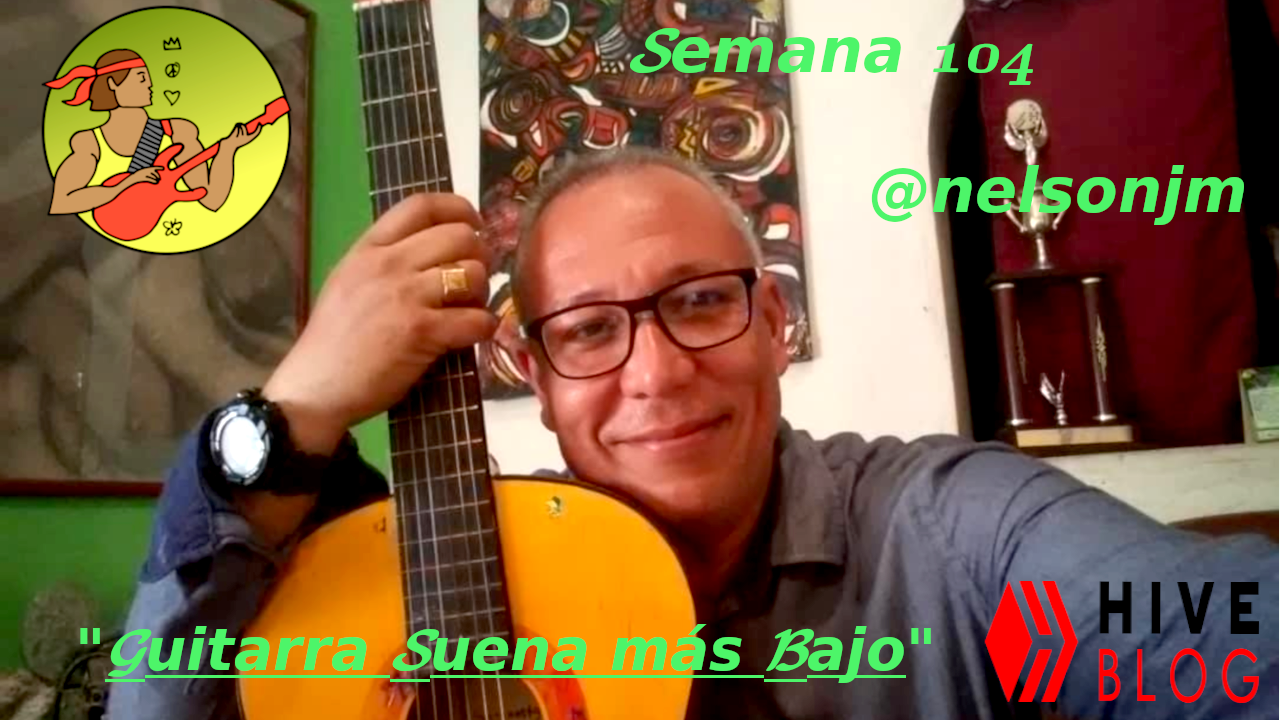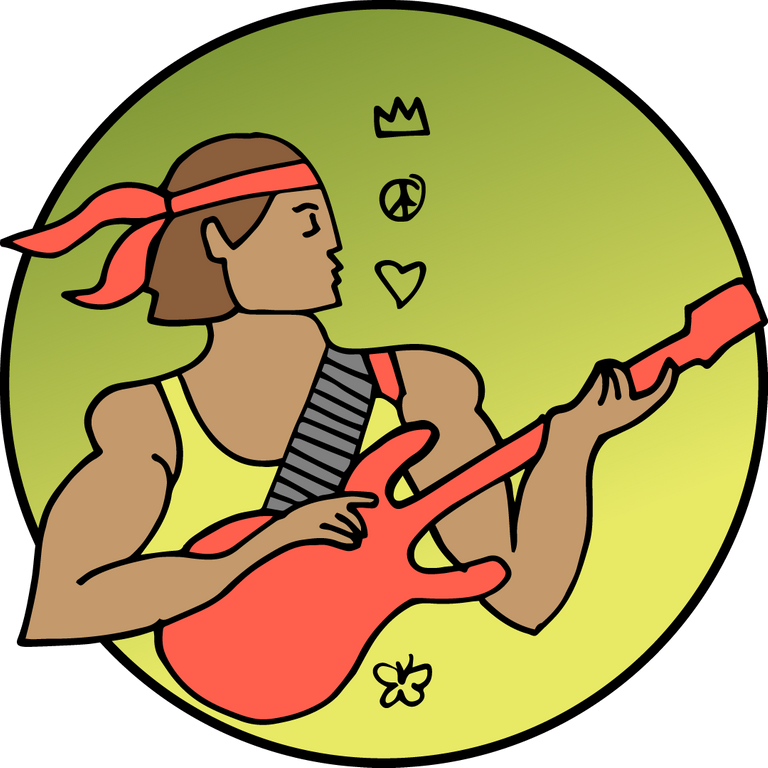
Hola amigos de Hive Open Mic, les habla el usuario @nelsonjm, para esta bendecida semana 104 con la convocatoria de “Guitarra Automática” seleccionado por el compañero @alejandrorigo; les cantare el Tema titulado “Guitarra Suena más Bajo” del Compositor y Cantante Nicola Di Bari del año 1972.
Hello friends of Hive Open Mic, this is the user @nelsonjm speaking to you, for this blessed week 104 with the call for “Automatic Guitar” selected by the colleague @alejandrorigo ; I will sing to you the Theme entitled “Guitarra Sounds Lower” by the Composer and Singer Nicola Di Bari from the year 1972.
El cantante Michele Scommegna (Zapponeta; 29 de septiembre de 1940), más conocido por su nombre artístico Nicola di Bari (pronunciación en italiano: /ni'kɔla di 'bari/), es un cantautor italiano. Ganó el Festival de San Remo en los años 1971 y 1972.
The singer Michele Scommegna (Zapponeta; September 29, 1940), better known by his stage name Nicola di Bari (Italian pronunciation: /ni'kɔla di 'bari/), is a singer-songwriter Italian. He won the San Remo Festival in 1971 and 1972.
En sus canciones se encuentra a menudo el tema de la emigración y el sentimiento de gran apego a la tierra natal, la región meridional de Apulia, y a la vida de los campos, con llamadas a la campiña y a sus colores. Una de las piezas que él compuso, Zapponeta, está dedicada a su ciudad natal; otro título suyo muy conocido es Paese.
In his songs one often finds the theme of emigration and the feeling of great attachment to the homeland, the southern region of Apulia, and to the life of the fields, with calls to the countryside and its colors. One of the pieces he composed, Zapponeta, is dedicated to his hometown; another well-known title of his is Paese.
En la década de 1960 comenzó su carrera musical; pero el tono de su voz no le permitió lograr el éxito con rapidez. En 1963 apareció su primer sencillo y al siguiente año logró cierta popularidad con el tema "Amor, Regresa a Casa". En 1965 fue invitado a participar en el Festival de San Remo, logrando llegar a la ronda final.
In the 1960s he began his musical career; but the tone of his voice did not allow him to achieve success quickly. In 1963 his first single appeared and the following year he achieved some popularity with the song "Amor, Regresa a Casa". In 1965 he was invited to participate in the San Remo Festival, managing to reach the final round.
En 1966 y 1967 se presentó en el festival, pero no logró llegar a la final. Su carrera continuó sin grandes éxitos, hasta que repentinamente en 1970, también en San Remo, logró reconocimiento al alcanzar el segundo lugar con el tema "La prima cosa bella".
In 1966 and 1967 he appeared at the festival, but failed to reach the final. His career continued without great success, until suddenly in 1970, also in San Remo, he achieved recognition by reaching second place with the song "La prima cosa bella".
La consagración definitiva le llegó en el año 1971, y en 1972 repitió su éxito. En 1974 se presentó una vez más en San Remo y llegó a finalista. En 1972 participó en el Festival de la Canción de Eurovisión.
The definitive consecration came in 1971, and in 1972 he repeated his success. In 1974 he performed once more in San Remo and became a finalist. In 1972 he participated in the Eurovision Song Contest.
Por sus canciones en castellano goza de gran popularidad en Hispanoamérica, entre ellas, "Los días del arco iris", "Lisa de los ojos azules" (1969), "Trotamundos" (1968), "Rosa", "Primera cosa bella", "El corazón es un gitano" (1971), "El último romántico" (1971) y "Como Violetas" (autores de Como violetas: Gaetano Améndola y Peppino Gagliardi). Sus éxitos lograron llegar a Argentina, Chile, Perú y otros países de Hispanoamérica, donde realizó giras y presentaciones entre los años 1970 y 1980. En su época de oro grabó y cantó muchos temas, incluso en castellano; y sus temas "Vagabundo" y "Guitarra suena más bajo", junto a otros más, recorrieron Hispanoamérica y lograron situarse entre los primeros en las listas de éxitos. Su estilo tan personal y romántico sirvió para que se le comenzara a llamar «El último romántico», gracias a un tema con ese nombre, el cual popularizó y también sirvió para darle mayor fama.
Because of his songs in Spanish, he enjoys great popularity in Latin America, among them, "The days of the rainbow", "Lisa de los ojos azul" (1969), "Trotamundos" (1968), "Rosa", "Primera cosa bella" ", "The heart is a gypsy" (1971), "The last romantic" (1971) and "Like Violets" (authors of Like violets: Gaetano Améndola and Peppino Gagliardi). His successes reached Argentina, Chile, Peru and other Latin American countries, where he toured and performed between 1970 and 1980. In his golden age he recorded and sang many songs, even in Spanish; and his songs "Vagabundo" and "Guitarra sounds lower", along with others, toured Latin America and managed to be among the first in the charts. His so personal and romantic style served for him to be called "The Last Romantic", thanks to a song with that name, which he popularized and also served to give him greater fame.
En 1971 gana en Canzonissima con "Guitarra suena más bajo", batiendo in extremis a Massimo Rainero; de esta canción también Mina, años después, ofrecerá una bella interpretación; en 1971 también es el año de un homenaje a Luigi Tenco, con el álbum Nicola Di Bari canta a Luigi Tenco.
In 1971 he wins at Canzonissima with "Guitar sounds lower", beating Massimo Rainero in extremis; Of this song also Mina, years later, will offer a beautiful interpretation; in 1971 it is also the year of a tribute to Luigi Tenco, with the album Nicola Di Bari sings to Luigi Tenco.
Esperando que sea de su agrado mi interpretación, se despide por esta semana este humilde Servidor
Hoping that my interpretation is to your liking, this humble Servant says goodbye for this week
"Guitarra Suena Mas Bajo" // "Guitar Sounds Lower"
Guitarra suena más bajo
Que alguien puede oírte
Quiero me lleves muy suave
Todo el amor que yo siento
Y nadie debe saberlo
Cantan los grillos del campo
Y un pájaro en el ramo
Ninguno duerme esta noche
Tampoco ella que a esta hora
Suspira aprieta la almohada
La luna firme en el cielo
Me roza con sus rayos
Guitarra mía sueña mas bajo
Aunque se asienta la mano
Sueña guitarra ya es hora
La hora de darle todo el bien que hay mi alma
Ceñirla con mi brazo y protegerla
Y así amarla como nadie puede
La hora de respirar el sol con aire puro
Un prado es verde cuando es primavera la noche viaja
Y el sol me deja junto ha mi amor
Me tiene ahora en su seno
La noche huele a heno
Dios como late su pecho
La gente sueña ha esta hora
Duerme guitarra ya es hora

Guitar sounds lower
that someone can hear you
I want you to take me very gently
All the love that I feel
And no one must know
- Crickets sing in the field
And a bird in the bouquet
no one sleeps tonight
Neither does she who at this hour
sighs squeezes the pillow*
*The moon steady in the sky
touches me with its rays
My guitar dreams lower
Although the hand sits
Dream guitar it's time *
- The time to give all the good that there is my soul
Encircle her with my arm and protect her
And so love her like no one can *
Time to breathe the sun with fresh air
A meadow is green when it is spring the night travels
And the sun leaves me together with my love
*He has me now in his bosom
The night smells like hay
God how his chest beats
People dream at this time
Sleep guitar it's time *
Congratulations @nelsonjm! You have completed the following achievement on the Hive blockchain and have been rewarded with new badge(s):
Your next target is to reach 30 posts.
You can view your badges on your board and compare yourself to others in the Ranking
If you no longer want to receive notifications, reply to this comment with the word
STOPTo support your work, I also upvoted your post!
Check out the last post from @hivebuzz:
Support the HiveBuzz project. Vote for our proposal!
Oh what a nice song. The lyrics make a great impression, I feel, and you carry the melody in a good way. Much to admire. Thank you, friend.
Ay que linda cancion Las letras causan una gran impresión, siento, y llevas la melodía de buena manera. Mucho que admirar. Gracias amigo.
Bravo primate! Que bueno verte cantando por aquí, te ha quedado genial, felicidades!